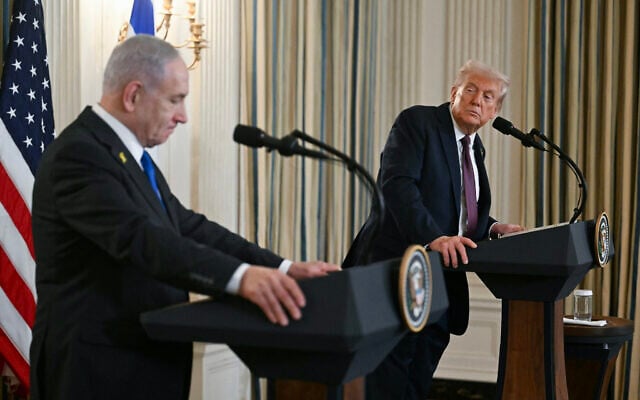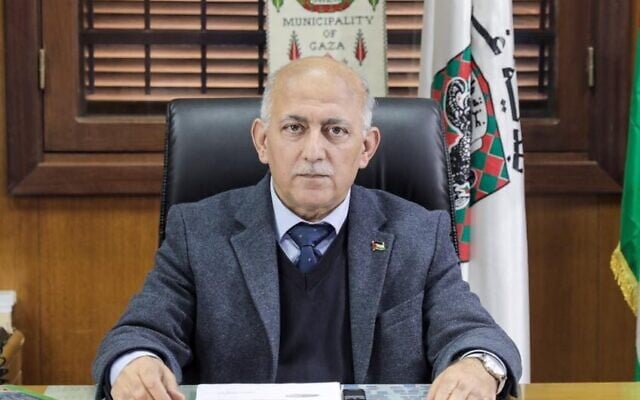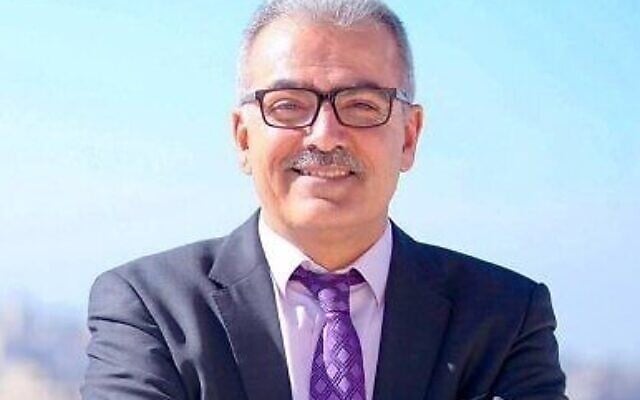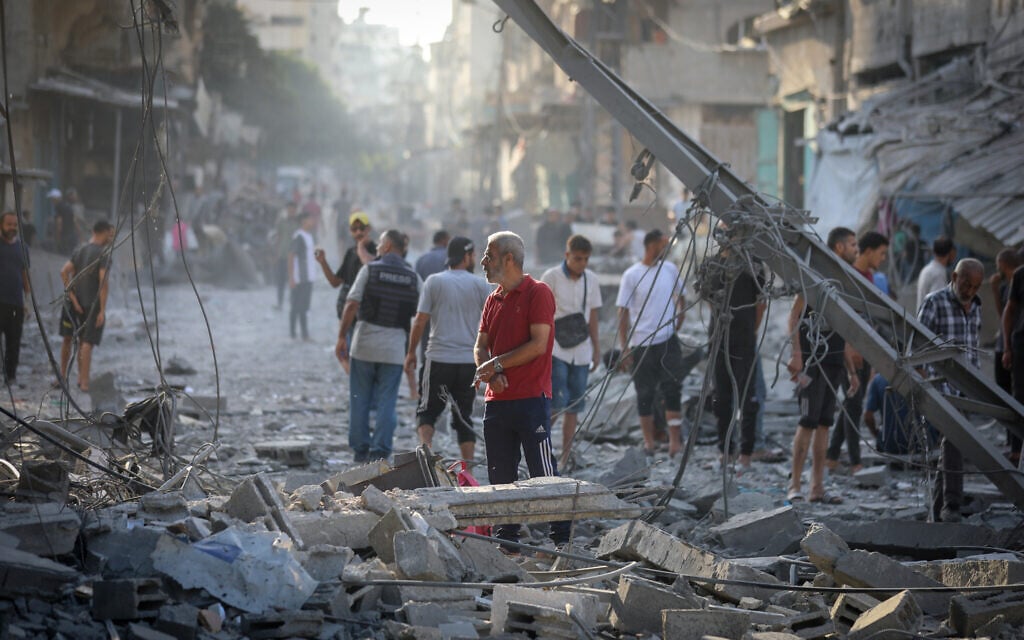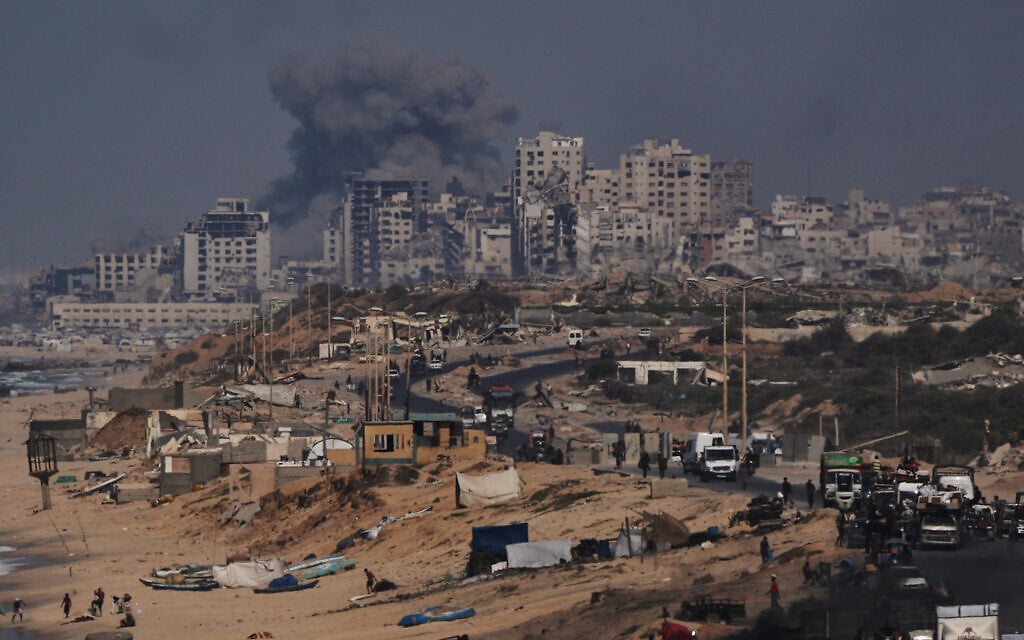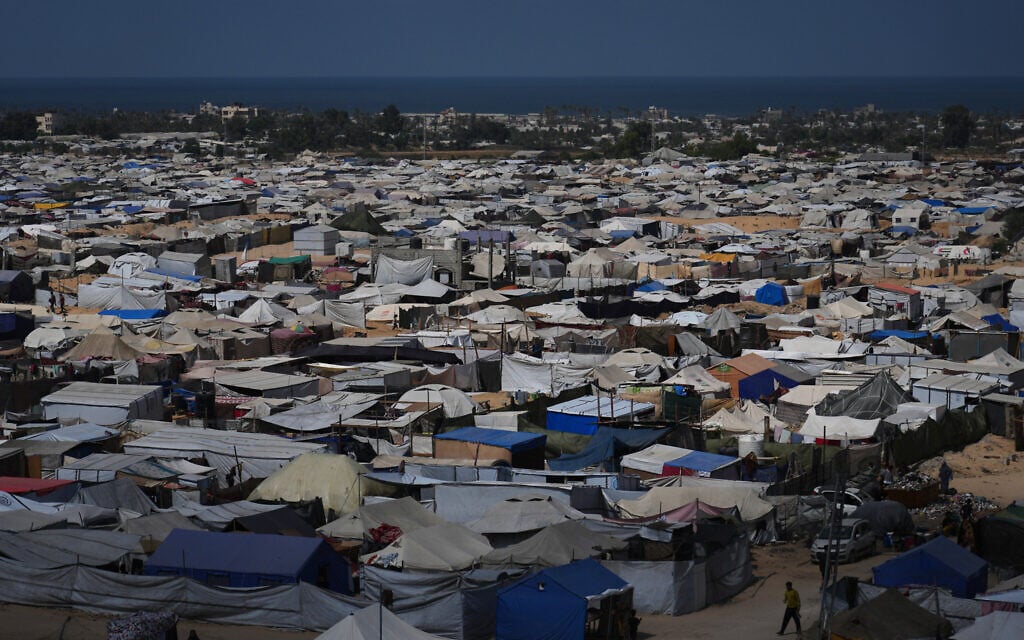

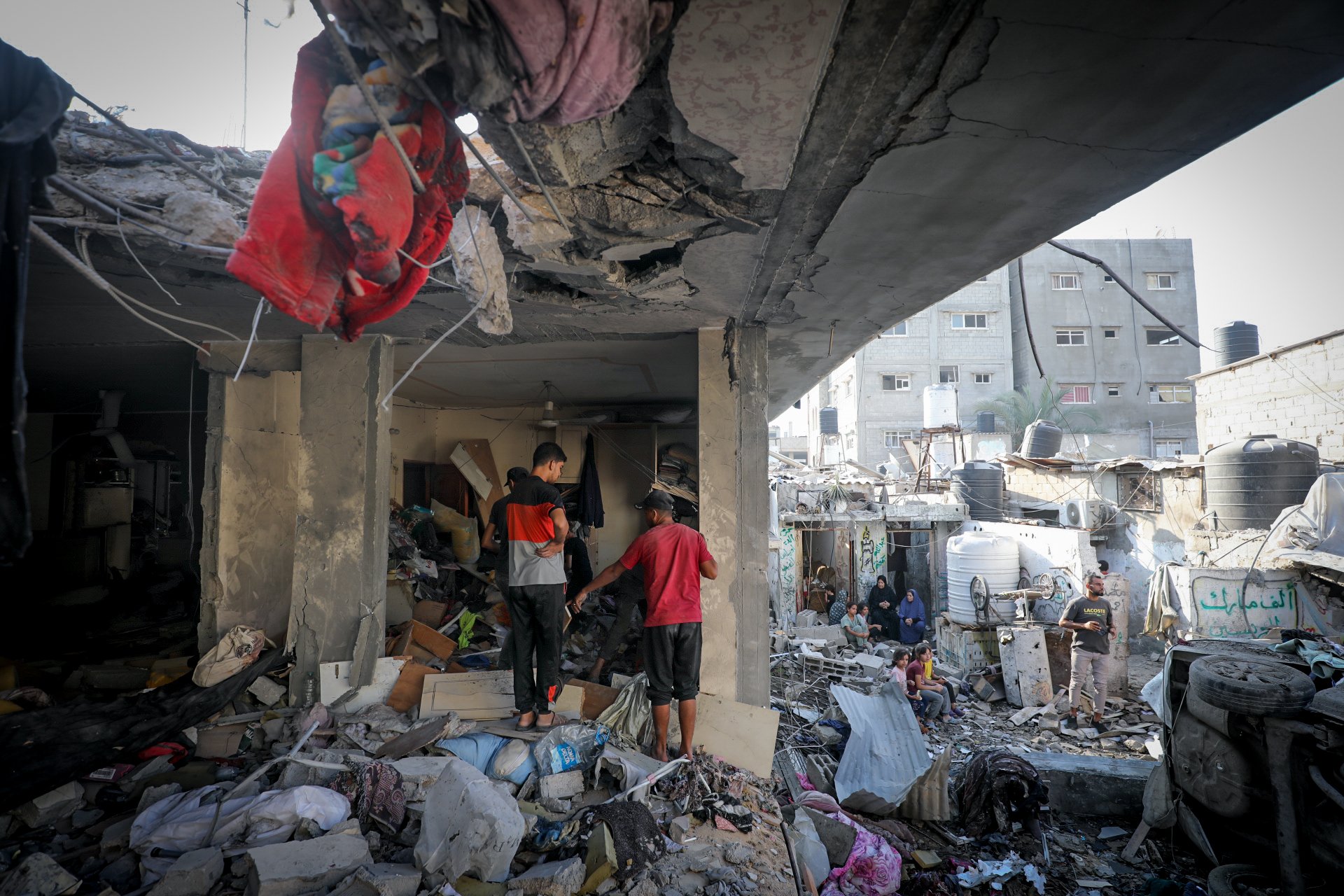
Before the ongoing Israel-Hamas war, Gaza Chamber of Commerce head Ayed Abu Ramadan was one of the key figures in the enclave’s economy, representing Gaza’s traders both inside the Strip and abroad.
Over the past two years, Abu Ramadan said, his situation has been “less difficult” than that of most Gaza residents — for instance, he currently lives in an apartment rather than in a tent, a rare luxury in a territory in which the United Nations estimates 90 percent of residential buildings to have been damaged or destroyed by Israel.
But like many others in Gaza, Abu Ramadan longs for one thing: an end to the war. In recent days, Abu Ramadan and 16 other prominent local figures in Gaza sent, through intermediaries, a letter to US President Donald Trump calling on him to pressure Israel and halt the fighting that began with Hamas’s bloody invasion of Israel on October 7, 2023. The group believes Trump received the letter by Friday.
“You have the power to succeed where others failed, to stop the bloodshed, protect innocent lives and set the stage for a just and lasting peace,” the signatories wrote in the letter to Trump, which was obtained by The Times of Israel.
“We know that the only one who can stop this war is Trump. He is one of Israel’s biggest supporters, and clearly, his influence on Israel is significant. He is the only one who can move the needle on this issue,” Abu Ramadan told The Times of Israel in a phone call from southern Gaza.
In a series of once almost unthinkable conversations between Gaza-based Palestinians and an Israeli news outlet, The Times of Israel spoke with four of the signatories this week. In unison, they called for an end to the war and distanced themselves from the Hamas terror organization that rules the Strip, saying the group no longer has the support of the public.
The letter is the first of its kind during the war in which members of Gaza’s elite are calling for a ceasefire and peace with Israel. According to the signatories, the letter reached Trump just as the White House was finalizing his plan to end the war.
On Monday, Trump laid out his peace plan during a White House press conference with visiting Prime Minister Benjamin Netanyahu. Trump declared that Washington is “beyond very close” to reaching a deal after Netanyahu accepted the proposal. A group of Arab and Muslim countries is committed to disarming Hamas.
Egyptian and Qatari mediators presented Hamas negotiators with the US proposal late Monday night, an Arab diplomat told The Times of Israel. On Tuesday, Trump said he’ll give the terror group “three or four days” to agree to the plan to free the Israeli hostages, end the war and begin the rehabilitation of Gaza.
The most prominent signatory is Gaza City’s mayor, Yahya al-Sarraj. Before the war, about 1 million people lived in Gaza City, making it not only the largest metropolis in the Strip but also the largest Palestinian city overall.
As with any other governing role in Gaza, the position of mayor traditionally required subordination to Hamas’s governing structures. But in a WhatsApp conversation with The Times of Israel, al-Sarraj categorically denied that he or the municipality had any affiliation with Hamas.
“The municipality is a local authority independent administratively and financially, and is not subordinate to any political entity or faction. Its role is only to serve citizens and provide services in water, sewage, sanitation, and urban planning,” he said. Al-Sarraj also described himself as politically independent, with an academic and professional background unrelated to any political movement.
“The Palestinians in Gaza love peace and want an immediate halt to the killing and destruction,” he stressed, adding that “the letter was sent now in order to push and encourage the US president to move forward with steps to end the war and not to miss the opportunity — for the benefit of all sides.”
Senior local figures from Gaza’s civil society, including businesspeople, academics, and doctors, have rarely spoken out over the past two years.
Abu Ramadan acknowledged that many among Gaza’s elite fled the Strip during the war. Between November 2023 and May 2024, the Rafah crossing into Egypt was open, allowing departures on ostensible medical grounds for those who could pay several thousand dollars to Egyptian companies operating the crossing, even without meeting medical criteria for treatment abroad.
“Of course, the departure of the elite — traders, businesspeople, doctors, and ordinary families, about 120,000 people in all — had a negative effect, even on morale, and on health and the economy,” Abu Ramadan said.
But, he added, “That doesn’t amount to 1% of the impact of the genocide. We can withstand any conditions, but the massacre now underway is extremely difficult.” (Israel categorically denies perpetrating a genocide in Gaza, where Hamas notoriously embeds itself in the civilian population to use its people as human shields.)
The Hamas-run Gaza health ministry says more than 65,000 people in the Strip have been killed or are presumed dead in the fighting so far, though the toll cannot be verified and does not differentiate between civilians and fighters. Israel says it has killed over 22,000 combatants in battle as of August and another 1,600 terrorists inside Israel during the October 7 onslaught, in which thousands of Hamas-led terrorists slaughtered some 1,200 people, most of them civilians, and abducted 251 to the Gaza Strip.
Abu Ramadan, who remains in Gaza along with the overwhelming majority of the letter’s signatories, made clear: “Despite everything, we will stay and not leave the Strip. We will not accept expulsion. We are rooted in the place where we are.”
Abu Ramadan explained that the signatories chose to write to Trump now because they felt the world misunderstood what was really happening in Gaza.
“People think it’s army versus army, fighting. What’s happening is an organized, total destruction of every aspect of life in the Gaza Strip. Just as they destroyed Rafah and Khan Younis, now they are destroying Gaza City.”
“This is a one-sided war against civilians, and it uses advanced, inhuman technology. There is a difference between a soldier and a robot,” he said, referring to remote-controlled vehicles packed with explosives that the IDF has deployed in Gaza to blow up buildings.
“There is no battle. The resistance [Hamas and other armed groups in Gaza] is not present,” Saif al-Din Odeh, a Gaza economist who previously worked at the Palestinian Authority’s Monetary Authority, told The Times of Israel by phone.
Odeh left his home in Gaza City just a week ago as Israeli forces advanced to capture the city.
“The army struck the roof of the house we lived in early in the morning; the top floor was hit, and we fled. If there was real resistance, would the city have been cleared out within two weeks? Would the army have had the chance to send in robots and bomb houses?” he said.
Odeh voiced deep concern about the Israeli offensive continuing in Gaza City, even briefly.
“If the bombardment continues this way, within a month not a stone will be left standing. And afterwards, the city will no longer be fit to live in. Is that the goal? Under the pretense of Hamas? There is no Hamas, no resistance, nothing. Maybe two or three people — that is not what you call a military confrontation.”
Odeh said he raised the matter personally with the Palestinian businessman Bashara Bahbah, one of the mediators in the talks with Hamas.
“I personally asked Dr. Bashara: This cannot go on, even for a few more hours. Every hour, they destroy hundreds of houses that have nothing in them. There must be a freeze — I’m not even saying stop the killing — but a freeze on the destruction that’s happening. Then there can be negotiations. Freeze it for two, three, four days, and let the politicians talk,” he said.
Many of the letter’s signatories are economic experts and have a sharper perspective on the financial collapse in the Strip. Abu Ramadan accused Israel of fostering corruption and chaos through its policies.
“It encourages corruption because it allows a limited number of traders to bring in goods at high prices, and chaos because it protects looters in areas under its control and encourages them to attack shipments of private or humanitarian goods. This is causing insane price hikes,” he claimed, estimating that hyperinflation in Gaza has reached 900%.
“Prices are nine times higher than before the war. More than 70% have no work. Of the 30% who do, it’s in the service sector — mostly health — with very low wages. There is no cash; Israel refuses to allow new banknotes into Gaza,” he said. “There is no Palestinian economy in Gaza. It’s finished. There was complete destruction of the business sector and of agriculture.”
Before the war, Gaza’s farmlands supplied residents with food — some for export, mainly fruits and vegetables. But Odeh said that returning to that after the war will require environmental rehabilitation.
“The land needs purification. Tens of thousands of explosives have seeped into the soil and it is poisoned,” he said.
Al-Sarraj said he remains in the Strip despite the battle for the city.
He described destruction everywhere: “Walking through the city, you see devastation in residential, commercial and cultural buildings, in hospitals, schools, universities, churches, mosques — everything was hit. Infrastructure too was destroyed: more than 75% of the water wells were wiped out, and many more are inaccessible. Sewage treatment plants, water and drainage systems were also hit. In short, the destruction has reached every facility and every neighborhood.”
Although the letter itself does not mention Hamas, some of the signatories spoke sharply against the movement in private. Marwan Tarazi, a businessman and chairman of the board of Gaza College — the enclave’s oldest private school, founded in 1942 — told The Times of Israel: “Hamas is a terrorist organization, we have no connection to it at all, so why all the killing of the people who are here?”
“Believe me, everyone in the street is now against Hamas,” Tarazi said. “If you ask anyone in Gaza, they’re against Hamas. This is not our tradition to do what happened on October 7. We need to live in peace with Israel, with the Jews.”
“Children, one- and two-year-olds, they’ve been wiped off the map,” Odeh said angrily. “Tens of thousands have been destroyed. Me, what do I care about the factions [armed groups in the Strip]? Let all the factions go to hell.”
The letter’s authors said they are not affiliated with any Palestinian political camp, but Abu Ramadan stressed that, in his view, the PLO and the PA are the ultimate authorities and the likeliest path to peace with Israel.
Though the letter did not lay out a detailed, orderly plan for the day after the war, Abu Ramadan laid out his vision.
“We call for a two-state solution, a comprehensive and just peace,” he said. “The Palestinian Authority certainly has a role in that vision, immediately or after a year or two — everything is open to discussion.”
“We need to breathe a little,” Tarazi said with a bitter laugh. “What happened in Gaza is a lot, it’s too much.”
He stressed that removing Hamas from the Strip is one of his top priorities for the day after the war. “The most important thing now is that the war stops, and secondly that Hamas is out.”
“The society in Gaza generally aspires to live in peace, without a blockade, with open borders and no restrictions on the movement of people and goods,” concluded al-Sarraj. “No one wants the war to continue.”
With contributions from Times of Israel staff.


